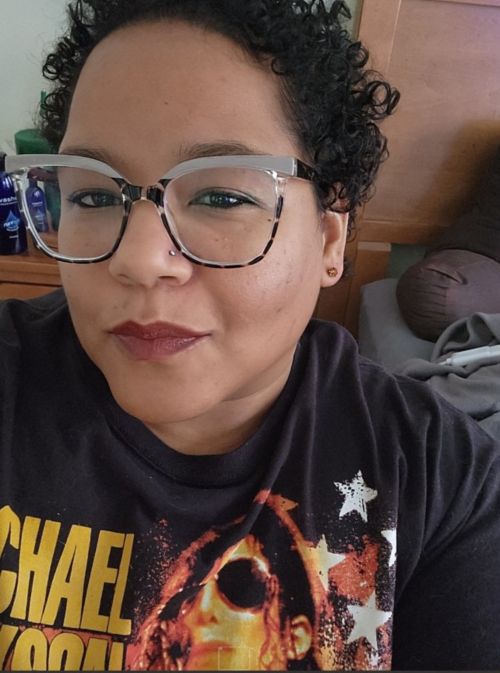Speak Up for Your Physical, Mental, and Emotional Health

Kayla Cooper
Kayla Cooper was 15 months old when she was diagnosed with neuroblastoma — a cancer that began near her kidneys and spread to her spine. The tumor in her spine left her unable to walk. She has used a wheelchair since age 3.
Growing up under the care of many different health care providers at Texas Children’s Hospital, Cooper faced challenges not only with her physical health but also with her emotional well-being. These early experiences shaped her understanding of the unique needs that survivors face.
Now 39, Cooper works as a medical social worker, helping others navigate journeys like hers. She finds that many patients often focus on their physical health, which is important. But Cooper stresses that emotional and mental health deserve equal attention, a lesson she learned through her own experiences with depression and anxiety.
“I help patients with their mental health and emotional well-being as they are navigating their own medical crisis or medical needs,” Cooper says. “That brings a lot of emotions: mental health, family conflict, different life stressors. I help these patients navigate these things. I connect them to resources and long-term mental health support.”
This support gives patients the tools they need to speak up for themselves — whether they are navigating the health care system or managing life’s challenges.
For Cooper, addressing mental health is not just about managing emotions during a medical crisis. It is also about empowering survivors to live fuller, healthier lives. Through her work, Cooper reminds patients and survivors that caring for their mental and emotional health is just as vital as managing their physical health. All are key to thriving after cancer treatment.
Cooper encourages patients to take a whole-health approach to self-advocacy. This means caring for physical, mental, and emotional health equally. That approach begins with being informed.
Being informed means understanding your health history, treatment records, and any ongoing health needs.
"One thing that I appreciate now is that we have access to our own health records," Cooper says.
This includes reading things like doctor's notes and lab reports to better understand diagnoses, treatment, and overall health.
“Even if you don’t fully understand it, reading your own information is important,” Cooper says.
Patients who understand and stay current on their health history can ask meaningful questions; feel more confident when talking with providers; and take steps toward managing their physical, mental, and emotional health.
The next step involves effective communication with health care providers. Cooper explains that, once patients are informed about their health, they can use that knowledge to ask questions.
“I always recommend asking questions about things you don’t understand,” Cooper says.
She encourages her patients to ask their provider to slow down if they talk too fast. Ask them to repeat themselves. It is OK to stop them and ask them to clarify what they are saying.
Taking ownership of physical health means actively engaging in and taking responsibility for your own health and well-being. It involves understanding your body, your medical needs, and your treatment options. It can lead to improved mental and emotional well-being.
Cooper says that understanding and actively taking part in your health can help reduce feelings of helplessness.
“Often, our emotions get out of control when we feel like we're losing control,” she says. “So, if we can take a little bit of control back, it just kind of relaxes us a little bit.”
Gathering information helps survivors make decisions about care. Cooper says she chose therapy and medicine to help her mentally and emotionally.
Working with health care providers is a key part of this process. Share your health history with your providers and ask for what you need. Cooper encourages survivors and caregivers to bring up mental health at appointments, ask questions, and request resources.
Advocating for your needs can happen in many ways. It might mean asking your medical team for a referral to a counselor or therapist who understands cancer survivorship. It could be seeking out peer support groups, where sharing stories with others who “get it” creates connection and hope. Or it might be practicing self-care strategies—mindfulness, journaling, or simply allowing yourself permission to rest emotionally.
Caring for your mental and emotional well-being is a vital part of living well after cancer. Your feelings are valid, your mental and emotional health matters, and advocating for your needs is an important step toward healing. Reach out. Speak up. You are not alone.